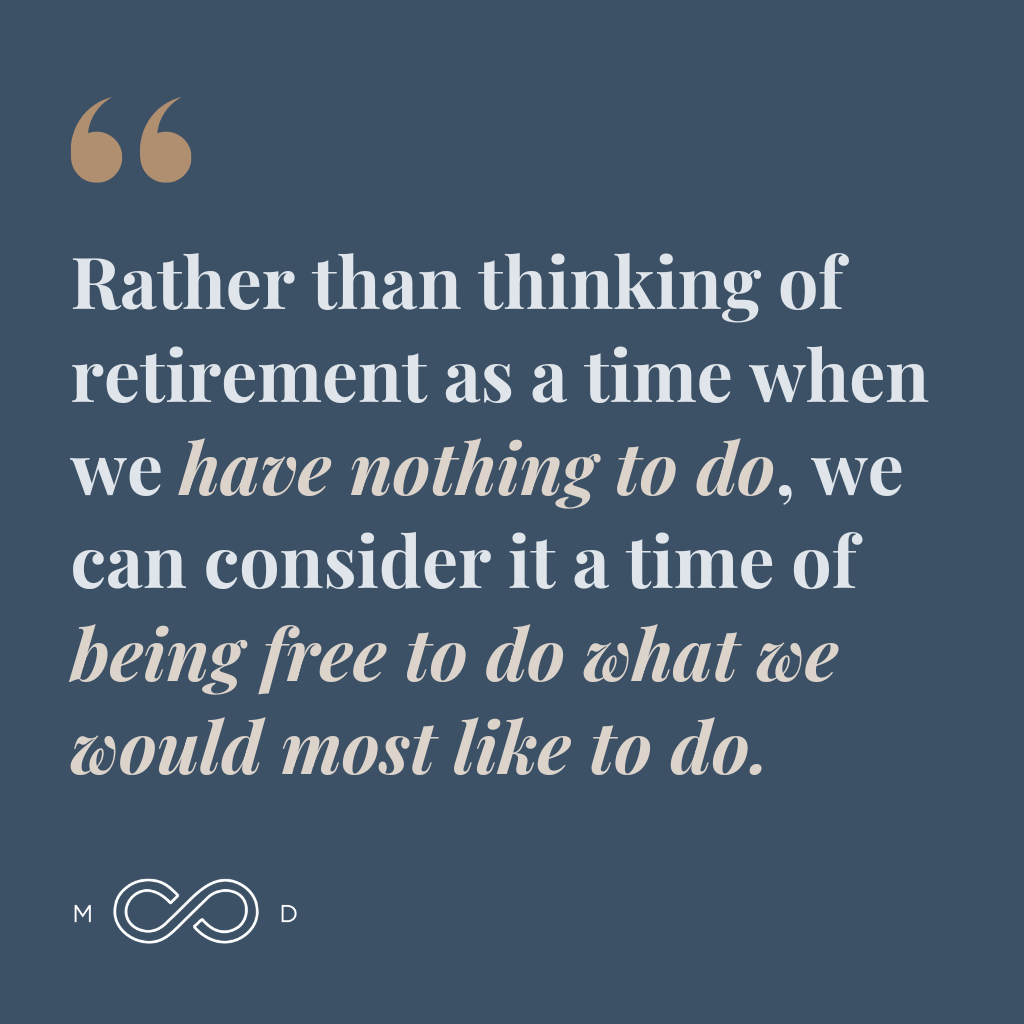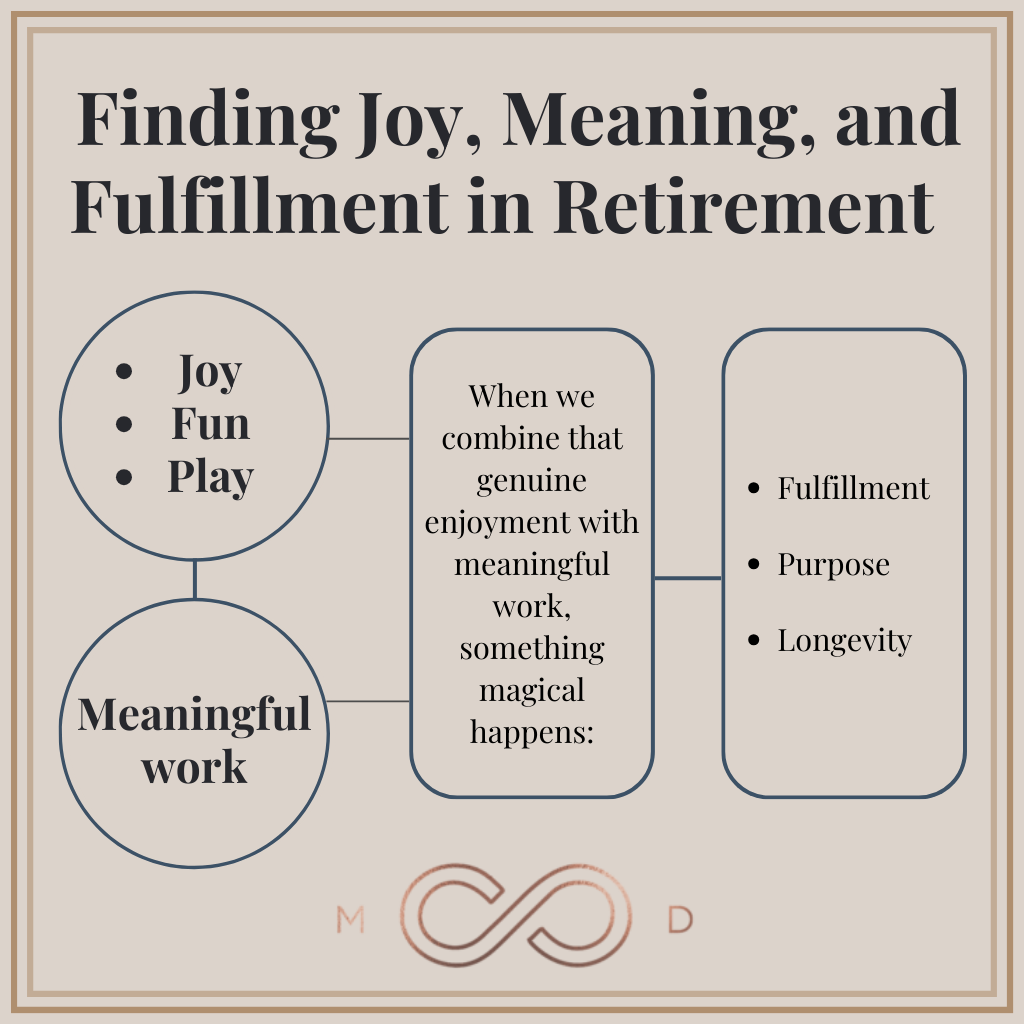Retirement.
It’s a word that evokes visions of umbrellas on the beach, hikes in the mountains, time with the grandkids, and more (depending on who’s doing the dreaming). But as retirement approaches, some people — especially driven, successful individuals — have concerns.
What will I do? How will I fill my time? Will I still make meaningful contributions? Who am I when I’m not working?
The modern idea of retirement isn’t appealing to everyone. And, as it turns out, it isn’t necessarily healthy, either. But does that mean you need to work till you drop? Thankfully, no.
It simply means we need to rethink our approach to retirement.
Why We Need to Rethink Retirement
As a physician who’s passionate about helping people live their fullest and longest lives, I’ve come to realize we need to seriously rethink the traditional concept of retirement.
In a post-Industrial-Revolution world, we’ve adopted a particular vision of retirement; it’s the pot of gold(en years) waiting at the end of a long and laborious rainbow. Work hard enough and long enough, and you get the ultimate reward: doing nothing.
In years past, lower average life expectancies meant few could hope to enjoy much of that reward. But today’s advancements in medical knowledge, technology, and resources mean living well past age 65 has become the expectation, not the exception. In other words, today we have a lot of potential time remaining after we hit retirement age.
The problem? In my practice, I’ve noticed that people tend to thrive well into their golden years when they “never retire” in the traditional sense.
Based on my experience and observations, reframing the idea of “retirement” seems to have a beneficial effect. Rather than thinking of retirement as a time when we have nothing to do, we can consider it a time of being free to do what we would most like to do.
Instead of seeing retirement as a finish line where we cease being productive, we can view it as a new beginning. It’s a time when we’re free to pursue what truly matters to us.
In my experience, the more compelling and meaningful the activities we engage in during our later years, the more alive and ambitious we feel. Often, this leads to an even more exciting future than we initially imagined retirement would bring.
The Power of Purpose-Driven Activities
Engaging in activities that fulfill us is fundamental to a positive human experience. When we have a clear vision of what our ideal future would look like, we’re able to choose the activities we want to pursue en route and the people we want to surround ourselves with for the long haul.
In my work with high-achieving individuals, one of the struggles I often see is the struggle with fun.
As children, no one needed to teach us how to play; our lives revolved around solving for joy, happiness, and fun. We had to learn responsibility, discipline, and sacrifice, all of which featured prominently in the pursuit of career and success. This is normal, but it often means we forget the joy of “play” along the way.
Retirement is a time for reconnecting with joy, fun, and play, though in a more mature framework. Then, when we combine that genuine enjoyment with meaningful work, something magical happens: we experience fulfillment, purpose, and longevity.
With such a combination, I’ve seen many individuals experience an incredibly rich “back half” of life — richer even than a first half filled with considerable achievements.
The Importance of Young Friendships
When you’re young, you tend to focus on and plan for the future — and so do those around you. In your 20s, 30s, and 40s, you have peers who influence you to think positively about the future and who provide a sense of support and camaraderie while doing so.
As you reach your 60s and 70s, however, looking 25–30 years into the future feels more daunting. Fewer and fewer peers are thinking this way; perhaps some have even passed early. You can easily feel alone when trying to focus on a compelling future.
The solution is, fortunately, simple: Continually integrate younger people into your social circle. By intentionally seeking out people 15–20 years younger, you infuse your life with youthful vitality and longer-horizon thinking, regardless of your age.
I see this with my patients, and I’ve seen the same principle at work in my own life.
At 50, I’m part of business networks where I’m often the oldest person in the room. Being surrounded by high-energy, ambitious professionals in their 30s and 40s is incredibly energizing. I find myself naturally connecting with their high-energy, goal-oriented, high-morale, long-horizon thinking, all of which feed into my personal ideal future — to continually increase my impact and help more people as I age.
Debunking Retirement and Aging Myths
Several misconceptions about retirement can lead people to feel “old” before their time. One of the most pervasive is the idea that retirement means ceasing all productive activity. This mindset not only fails to bring the satisfaction and fulfillment many expect, but it can also be detrimental to your health and longevity.
The truth is, our condition as humans seems to demand that we have something meaningful to do — something bigger than ourselves. On an individual basis, then, it’s a valuable exercise to rethink what retirement means for you. What should it look like, and why is that true?
Now that we’ve collectively seen the unintended negative consequences of the traditional retirement mindset, we have the knowledge to create a more rewarding alternative. Of course, this implies the need for strategic thinking and intentional planning. It’s not a passive process, but it’s a worthwhile one.
Crafting a rich and fulfilling back half of life is entirely possible. But it must be curated, created, and defended. It’s up to each of us to take charge of our future and design a retirement that keeps us young in heart and mind, engaged with the world, and excited about what each new day will bring.
Keep Your Mind Young: The Big Picture
All of this only matters if you aspire to live a long, vibrant, and fulfilling life — one with later years characterized by high activity, meaningful contribution, and personal growth. When we approach aging with this mindset, we’re better equipped to tackle new challenges, solve higher-quality problems, and make continual progress in meaningful ways.
The traditional retirement reward of “getting to do nothing” isn’t a prize for humans who want to live a long time and feel great want. True fulfillment comes from having a purpose larger than yourself, facing new challenges, and making a positive impact on the world around you.
With the right mindset and approach, your later years can be some of the most rewarding and impactful of your entire life. The earlier you can get eyes on what you want the back half of your life to look like — what activities you want to do, what impact you want to make, who you want around you — the more effectively you can plot your course in that direction.
Let’s redefine retirement — not as an ending, but as the beginning of your next great adventure.

Dr. Aaron Wenzel is a concierge physician specializing in the care of fast-moving entrepreneurs, executives, and public figures in the Nashville, TN area. Dr. Wenzel’s diverse life experience and extensive training in family medicine, emergency care, nutrition, and hormone replacement therapies give him the unique platform to provide unmatched care for his patients.









